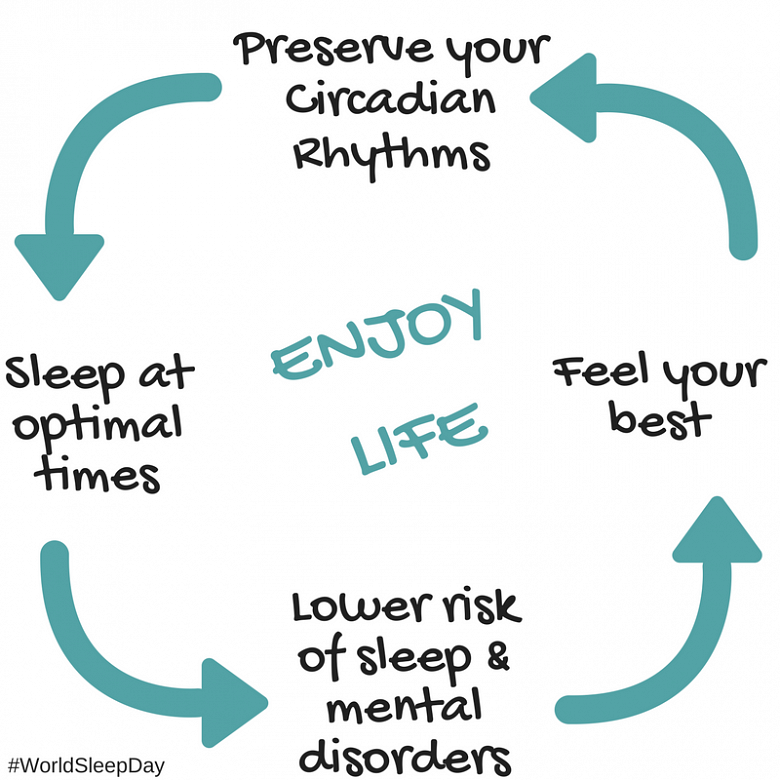
World Sleep Day (March 16, 2018) incorporates the slogan, ‘Preserve Your Rhythms to Enjoy Life’. This is aimed to raise awareness of the importance of circadian rhythms in healthy sleep and wellbeing. So, what does this mean and how can we help our school aged children to preserve their sleep rhythms?
What is circadian rhythm? It’s our 24-hour internal body clock that cycles between sleepiness and alertness at regular intervals. To keep our body clock regulated, our bodies react to external stimuli like light – the most important - temperature, meal times and social activities. They keep our body clock in rhythm and let us know when it’s time to do different functions such as sleep, being very alert or for concentration.
Why is circadian rhythm important to healthy sleep and well-being? Preserving regular circadian rhythms have been found to lower the risk of sleep disorders, mental health disorders and chronic health issues such as obesity and diabetes. A 2017 Nobel prize was won by three scientists (Hall, Rosbash and Young) who helped to unravel how our bodies tell the time and the critical implications for our health and well-being.
So what can we do to help our school-aged children preserve their natural sleep rhythms? HappySleepers has some top tips:
Promote regular sleep / wake times. By three to six months most infants have a regular sleep-wake cycle. For our school aged children, encouraging regular times for sleeping and waking helps your child’s body clock to align to these patterns. Know how long your child should need to sleep for and set limits around bedtimes.
Avoid a lie-in at weekends. Tempting as this might be, this can disrupt your child’s body clock. Avoid having very late nights and long lies at the weekend. For older children, staying up watching that late night film until 1 or 2 in the morning and then lying in bed until the afternoon the next day will really make Monday mornings hard to deal with. It creates a ‘jet lag effect’.
Avoid daytime naps. If your child is getting enough quality sleep, they shouldn’t feel the need to nap. Getting into the habit of sleeping during the day, even for a brief spell, may start to shift your child’s circadian rhythm.
Encourage your child to get out into natural light for at least 30 minutes, in the early part of the day. This helps to later create melatonin, which is released as the light changes from day to night.Your child’s brain recognises even the most subtle changes of light and the release of melatonin is a signal to the body to get ready for sleep.
Avoid caffeine based drinks – chocolate, soft drinks or ‘energy’ drinks and especially after lunchtime. Caffeine can supress melatonin production for up to 10 hours.
Exercise is helpful, but not close to bedtime. Exercise raises body temperature and cortisol levels making it difficult to go to sleep soon afterwards.
Focus on good bedtime habits in the hour before bed. Minimise the impact of technology – ideally switch it off! Encourage a relaxing pre-bed wind down routine.
Be prepared for adolescence! Changes to circadian rhythm occur during adolescence and most teenagers experience a sleep phase delay of up to 2 hours. This shift in circadian rhythm causes them to naturally feel alert later at night. Since most teenagers have early school start times along with other commitments, this sleep phase delay can make it difficult to get the sleep adolescents need.


